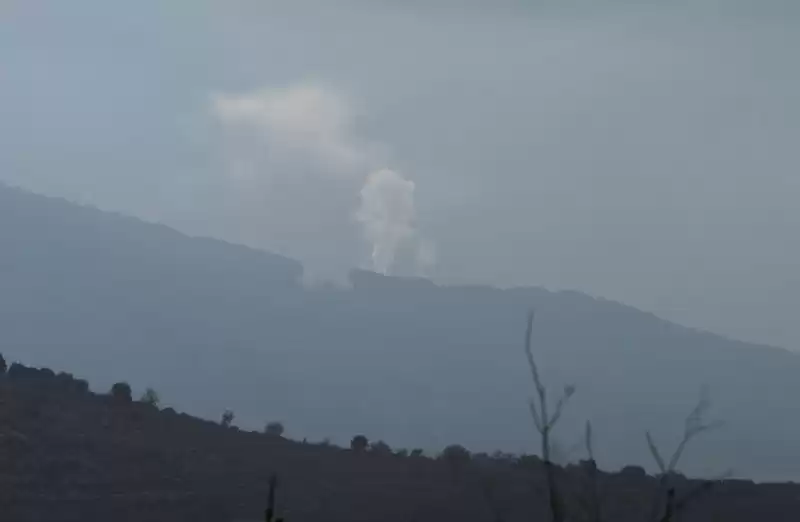What is Hezbollah in Lebanon?
Hezbollah targeted Israeli military positions in the disputed Shebaa Farms, leading to artillery barrages from Israel. No casualties reported.
In a show of solidarity with the Palestinian people, Lebanon's Hezbollah targeted Israeli military positions in the disputed Shebaa Farms. This action came in response to an unprecedented attack by Hamas gunmen from Gaza into Israel. Israel retaliated by launching barrages of artillery into southern Lebanon, but no casualties have been reported thus far.
Hezbollah, a Shi'ite group backed by Iran, has evolved from a shadowy faction established during Lebanon's civil war to a heavily armed force with significant influence over the Lebanese state. Many governments, including the United States, consider Hezbollah a terrorist organization.
Hezbollah was founded in 1982 by Iran's Revolutionary Guards with the aim of exporting its Islamic Revolution and combating Israeli forces that had invaded Lebanon. Sharing Tehran's Shi'ite Islamist ideology, Hezbollah recruited among Lebanese Shi'ite Muslims.
During the civil war, Hezbollah retained its weapons to fight against Israeli forces occupying the predominantly Shi'ite south. Years of guerrilla warfare led to Israel's withdrawal in 2000.
Hezbollah demonstrated its military prowess in 2006 during a five-week war with Israel. The conflict erupted after Hezbollah crossed into Israel, kidnapping two soldiers and killing others. The war resulted in the deaths of 1,200 people in Lebanon, mostly civilians, and 158 Israelis, mostly soldiers. Hezbollah fired thousands of rockets into Israel.
Since 2012, Hezbollah has deployed forces into Syria to assist President Bashar al-Assad in his fight against predominantly Sunni rebels. This deployment has further strengthened Hezbollah's military capabilities.
Hezbollah claims to possess precision rockets capable of striking all parts of Israel. Its leader, Sayyed Hassan Nasrallah, stated in 2021 that the group has 100,000 fighters. Iran provides Hezbollah with weapons and financial support, with the United States estimating that Iran has allocated hundreds of millions of dollars annually to the group in recent years.
Hezbollah has strong ties to other Iran-backed groups in the region, including the Palestinian factions Hamas and Islamic Jihad. During the recent attack by Hamas gunmen, Hezbollah stated that it was in direct contact with the leadership of the Palestinian resistance.
Hezbollah has also been involved in training Iran-backed groups in Iraq and has participated in fighting there. Saudi Arabia alleges that Hezbollah has supported the Iran-allied Houthis in Yemen. However, Hezbollah denies these claims.
In Lebanon, Hezbollah's influence is rooted in its arsenal and the support it receives from many Shi'ite Muslims who view the group as a defender against Israel. However, Lebanese parties opposed to Hezbollah argue that the group has undermined the state and led Lebanon into conflicts without consultation.
Hezbollah has ministers in the Lebanese government and lawmakers in parliament. In 2008, a power struggle with Lebanese adversaries supported by the West and Saudi Arabia resulted in a brief conflict. Hezbollah fighters took control of parts of Beirut after the government threatened to take action against the group's military communications network.
Following the withdrawal of ally Syria from Lebanon in 2005 after the assassination of former Prime Minister Rafik al-Hariri, Hezbollah became more involved in politics. The group and its allies won a parliamentary majority in 2018, and in 2016, the Hezbollah-allied Christian politician Michel Aoun became president. Although the parliamentary majority was lost in 2022, Hezbollah continues to exert significant influence.
Hezbollah faced accusations of being involved in attacks on Western targets in the 1980s. Lebanese security officials and Western intelligence believed that groups linked to Hezbollah carried out suicide attacks on Western embassies and targets and kidnapped Westerners. Imad Moughniyah, a top Hezbollah commander, was suspected of leading one of these groups and was killed in a car bomb in Syria in 2008.
The United States holds Hezbollah responsible for the 1983 suicide bombing that destroyed the U.S. Marine headquarters in Beirut, killing 241 servicemen, as well as the suicide bombing on the U.S. embassy in the same year. A suicide bombing also targeted a French barracks in Beirut in 1983, resulting in the deaths of 58 French paratroopers.
Hezbollah leader Nasrallah claimed in a 2022 interview that these attacks and hostage-takings were carried out by small groups not directly linked to Hezbollah.
Many Western countries, including the United States, classify Hezbollah as a terrorist organization. U.S.-allied Gulf Arab states, such as Saudi Arabia, also designate Hezbollah as a terrorist group. The European Union considers Hezbollah's military wing a terrorist organization, but not its political wing.
Argentina holds Hezbollah and Iran responsible for the 1994 bombing of a Jewish community center in Buenos Aires, which killed 85 people, and for a 1992 attack on the Israeli embassy in Buenos Aires, resulting in 29 deaths. However, both Hezbollah and Iran deny any involvement in these attacks.











Comments on What is Hezbollah in Lebanon?